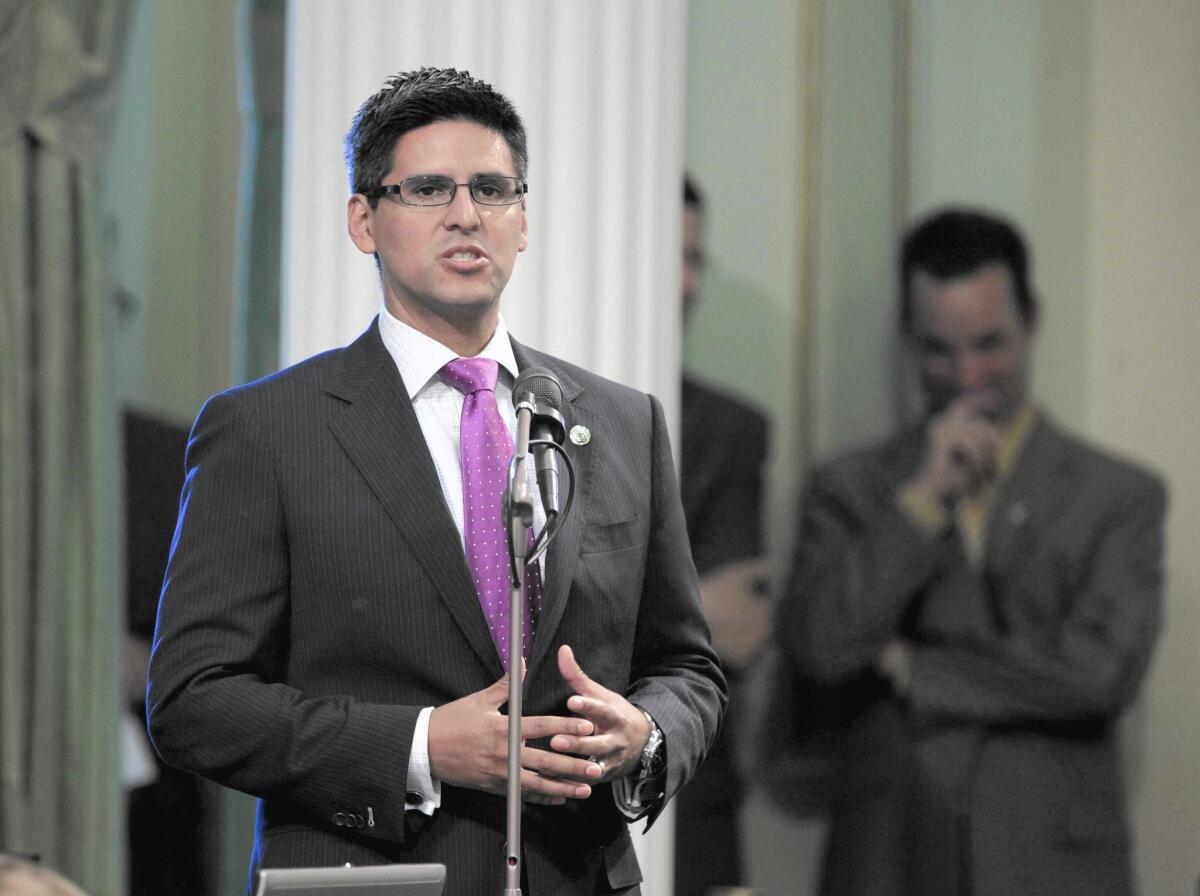Capitol Journal: Let the governor fill vacant legislative seats instead of costly special elections

in SACRAMENTO — The legislative year begins with a conspicuous vacancy. Not because a lawmaker got convicted or died, but because he leaped the fence for greener pastures. Meaning money.
While lush green in financial feed, his new field is on the dark side: the realm of special interest lobbying.
But this is America. No one is forced to stay in any job.
The really stinky part of a legislator dumping his constituents in midterm and turning lobbyist, however, is that local taxpayers must shell out for a special election to replace him.
We’re talking about an unexpected expense of $100,000 to $1 million or more. And it’s a burden frequently heaped on citizens all over California.
Why not just allow the governor to fill the vacancy temporarily until the next regular election?
A governor can do that when there’s an open seat on a county Board of Supervisors. Same deal with a statewide elective office.
When a U.S. senator quits or dies, the governor can fill that vacancy. But if a U.S. House member leaves office, the Constitution requires a special election.
California has held 57 special primary and general elections to fill legislative and congressional vacancies in the last 10 years. Three-fourths have been for state legislative seats. Get rid of them.
But let’s back up.
What prompted this rant was the unexpected announcement last month that Democrat Henry T. Perea, 38, of Fresno was leaving the Assembly in midterm for a special interest job. Later, he revealed that he would become the chief lobbyist in California, Arizona and Nevada for the pharmaceutical industry.
California law forbids Perea from personally lobbying his former colleagues for a year. But he told the Fresno Bee that, in the meantime, he’ll be giving “strategic advice” to those who can lobby legally.
“It’s a generational opportunity,” Perea told Times reporter Melanie Mason. “And it’s the right decision for me and my family.”
But maybe not for the Fresno voters who chose him as their assemblyman. They live in one of the poorest areas of the state and need their own full-time lobbyist in Sacramento. No one currently represents them in the Assembly.
Although not a legislative leader, Perea had power as unofficial head of the “mods” — business-friendly Democrats — who last year blocked the governor’s attempt to cut petroleum use by half.
Perea’s defection from the Legislature “is heart-wrenching to a community,” Dillon Savory, political director of the Fresno Central Labor Council, told reporter Laurel Rosenhall of the nonprofit news service Cal Matters.
“You went to these people asking them to vote for you … then you back out and claim it’s for a personal reason. That’s just not good enough for people. We all have personal problems and we still go to work every day.”
Perea didn’t respond to my request to explain his side.
But, seemingly, it’s basically this: He was termed-out of the Assembly at the end of this year anyway. Running for higher office would have been difficult. He has a wife and two kids. And heading a lobby team, he’ll presumably be making much more than the $100,111 base pay for legislators. Moreover, lawmakers elected after 1990 — when foolhardy term limits were enacted — aren’t eligible for pensions.
Of course, being a legislator isn’t exactly involuntary servitude. A lawmaker hauls in $168 in tax-free expense money each day the Legislature is in session.
Perea’s decision to turn lobbyist continues an unfortunate trend. Two other lawmakers — one from each party — did the same thing in 2013. Still, most vacancies are caused by legislators changing offices.
Gov. Jerry Brown has called a special primary election to fill Perea’s seat for April 5.
If no candidate receives a majority of the vote, there’ll be a special general election June 7 that coincides with the regular primary. The front-runner is Democrat Joaquin Arambula, an emergency room physician whose father once was an assemblyman.
Fresno County estimates the special election cost at around $500,000.
“You can’t put a price tag on democracy,” Secretary of State Alex Padilla told me. “Elections are what our democracy is based on.”
Too bad Sacramento doesn’t espouse that same sentiment when it comes to holding presidential primaries early enough to give Californians a meaningful role in choosing nominees for the White House.
Another sad thing about special legislative elections is that they draw pathetic turnouts.
Only 6% of registered voters showed up for a stateSenate contest last year in Los Angeles and San Bernardino counties. Just 7% turned out for an L.A. election in 2014. Typically they seem to average from 10% to 15%.
See more of our top stories on Facebook >>
Former Senate leader Darrell Steinberg (D-Sacramento) introduced a bill in 2014 that would have allowed the governor to fill a vacancy. It would have been filled with someone from the same party as the departing legislator. And the affected house could reject the selection.
But Republicans worried that a Democratic governor would play games with a GOP opening, maybe naming — heaven forbid — a moderate. So the measure didn’t make it to the Senate floor.
That bill should be reintroduced with one amendment: Require the governor to choose from a list of replacements acceptable to the affected party.
Don’t like that? Here’s an alternative: Require the deserting lawmaker to pay for the special election he caused. He could dip into his own political stash.
At last count, Perea still had access to campaign kitties worth about $1 million.
Twitter: @LATimesSkelton
More to Read
Sign up for Essential California
The most important California stories and recommendations in your inbox every morning.
You may occasionally receive promotional content from the Los Angeles Times.











